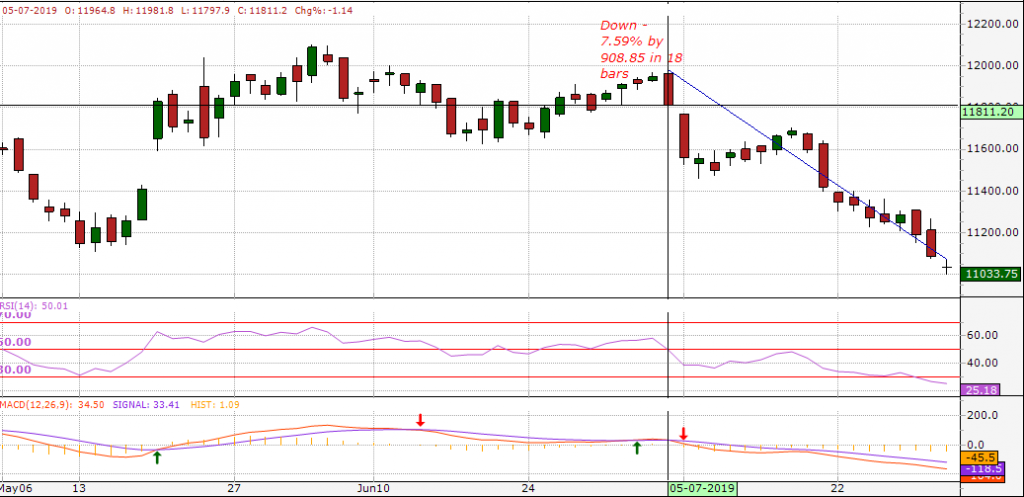The Union Budget of India for 2019–2020 was presented by Finance Minister, Nirmala Sitharaman on 5 July 2019, 11 am.
The Nifty has lost over 900 points since the day of the budget announcement.
That is somewhat unexpected taking into consideration that it was supposed to be a progressive budget intended to put more money in the hands of the people. Union Budget 2019 has delivered a rude shock for the market.
If in the last Union Budget, it was long-term capital gains tax of 10% on profit above Rs 1,00,000 on sale of equity shares which jolted Sensex and Nifty, this season a host of several announcements has attacked sentiment across Dalal Street.
While Sensex is down by 6.7%, Nifty is down by 7.6%.since July 5. The market has given a big thumbs down to the Union Budget 2019. The following are the factors that have spooked investors.
Tax on Buyback of Shares
With the Union Budget offering a 20% tax on buyback of shares by listed companies, IT services companies will probably choose more dividend payout instead of following an intricate process to do a share repurchase. This was supposed to plug the loophole with reference to dividend distribution tax (DDT). In the process, this tax may put a steep cost on investors who invested recently. It is also prone to dissuade most companies from buyback plans.
Public shareholding
The offer to boost the public shareholding from 25% to 35% may be a good move on paper. However, it means a huge supply of shares in the market. Add to that, the decision in the budget to sell majority stakes in a host of PSUs. This could be a case of too many shares chasing too little money. That is a recipe for pressure on valuations.
No change in LTCG tax on equity
The budget failed to impress stock market investors as they were expecting Nirmala Sitharaman to roll back long term capital gains (LTCG) tax on equity investments in Budget 2019.
Effect on FPIs
The government has raised additional surcharge on top of the applicable income tax rate from 15% to 25% for those with taxable incomes of between Rs 2 crore and Rs 5 crore, and to 37% for those earning more than Rs 5 crore. This takes the effective tax rate for those two groups to 39% and 42.74%, respectively. This has had an indirect effect on Foreign Portfolio Investors (FPIs) as they were mostly registered as individuals and hence have to pay more tax now. As a result of this Rs 3700 cr has been withdrawn from the Indian markets by FPIs causing the markets to tank since the budget announcement.
Taxes and Auto sector
A hike in Excise duty of ₹1 on petrol as well as diesel might increase the woes of the auto sector, which has already been reeling under the consequence of falling demand. With the additional push for electric vehicles (EVs) through the reduced GST rate of 5%, auto companies will now have to shift their focus to EVs. This, again, can result in some short term stress as auto stocks might continue to suffer. However, once the industry has had time to adjust and move to EVs, they will become more immune to fuel price changes.
Corporate Tax Rate slashed
The Corporate Tax Rate has been slashed to 25% from 30% but only for those with turnover < Rs 400 cr. Although this may be covering more than 99% of the companies, most analysts believe that the tax rate should have been slashed across the board for all companies considering the difficult economic environment faced by corporate India.

The point of effect on FPIs are debatable. The amount pulled out by the FPI was balanced by DII buying.
Even as vice versa union budget too has a great impact on stock market